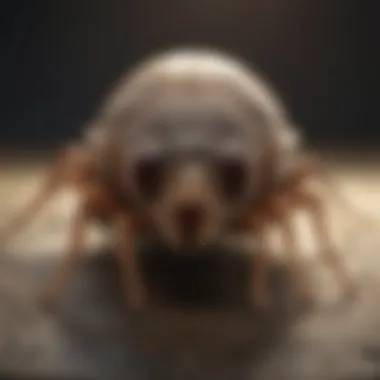Expert Insights on Pest Control in Ithaca, NY


Intro
Pest management is a critical concern for homeowners in Ithaca, NY. Understanding the type of pests that may invade a home is essential. Exterminators play a key role in controlling these pests effectively. Knowing how to identify these pests, applying treatment options, and establishing preventive measures can save homeowners from extensive damage and stress.
Effective pest control requires a combination of knowledge, action, and prevention strategies. This article provides insights into common pest issues, the importance of proper identification, and various mitigation strategies available to enhance the well-being of your living space.
Pest Identification
Identifying pests accurately is the first step in proper pest management. Different pests often require specific treatment methods. Here are some common pests found in Ithaca, NY:
- Ants: Common varieties include carpenter ants and pavement ants. They often build colonies inside walls.
- Termites: Often mistaken for ants, termites can cause significant structural damage as they feed on wood.
- Rodents: Mice and rats are notorious for invading homes, searching for food and shelter.
- Bed Bugs: These pests are small, reddish-brown insects that hide in mattresses and furniture, causing itchy bites.
Detailed descriptions of common pests
- Carpenter Ants:
- Termites:
- Mice:
- Bed Bugs:
- Size: About 0.25 to 0.75 inches long.
- Color: Black or bicolored.
- Nesting Habits: Prefer damp or decayed wood.
- Size: Approximately 0.12 to 0.5 inches long.
- Color: Light brown to white, depending on the species.
- Nesting Habits: Live in colonies, often inside wooden structures.
- Size: About 2.5 to 4 inches long, not including the tail.
- Color: Brown or gray, with a lighter underside.
- Nesting Habits: Often build nests in secluded areas such as attics.
- Size: About 0.25 inches long and flat.
- Color: Reddish-brown with a swollen shape after feeding.
- Nesting Habits: Hide within seams of mattresses, furniture, and cracks in walls.
Signs and symptoms of infestations
Detecting a pest problem early can reduce the severity of an infestation. Here are some signs to look out for:
- Ant trails: A line of ants is a clear indicator of a nearby colony.
- Wood damage: Sawdust or hollow sounds in wood can indicate termite activity.
- Droppings: Tiny droppings in food storage areas point to mice or cockroaches.
- Bite marks: Insect bites, especially in a linear pattern, may indicate a bed bug issue.
Prevention Strategies
Preventing pests from entering your home involves maintenance and creating barriers. Here are several useful strategies:
Home maintenance tips for pest prevention
- Seal cracks and openings: Check for openings around windows, doors, and foundation.
- Proper drainage: Ensure water drains away from the foundation to avoid attracting pests.
- Regular cleaning: Keep counters clean and food stored properly to limit food sources for pests.
Natural deterrents and barriers
Natural options can deter pests without harmful chemicals. Consider these methods:
- Diatomaceous earth: A natural substance that kills insects by damaging their exoskeleton.
- Essential oils: Peppermint and tea tree oil can repel ants and spiders.
- Neem oil: A natural insecticide effective against various pests.
Treatment Options
When an infestation occurs, understanding treatment options is vital. You can choose between chemical and natural solutions.
Overview of chemical vs natural treatments
- Chemical treatments: Often strong and effective. However, they can pose health risks if misused. Follow instructions carefully and consider professional help.
- Natural treatments: Generally safer for humans and pets but may take longer to work.
Step-by-step guides for DIY treatments
- For Ants:
- For Bed Bugs:
- For Mice:
- Mix one part vinegar with one part water. Spray the solution on ants and wipe areas where you see them.
- Wash infested bedding in hot water. Use a vacuum to remove bugs from furniture.
- Set traps with peanut butter or cheese. Place traps along walls where activity is noted.
Pest control is an ongoing task. Regular monitoring and prevention are essential.
This comprehensive understanding will equip homeowners with the knowledge needed to handle pest-related challenges. Through careful identification, proactive prevention, and informed treatment options, it is possible to maintain a pest-free home.


Understanding Pest Control in Ithaca, NY
Pest control is an essential topic for homeowners in Ithaca, NY. Understanding the problem, methods, and implications can ensure effective management of pest issues. Various pests inhabit homes and businesses, creating health risks and property damage. When dealing with these pests, homeowners often wonder about the best ways to tackle the issue.
An in-depth understanding of pest control helps in recognizing the signs of infestation early. It equips homeowners with knowledge about specific pest characteristics, behaviors, and life cycles. Such awareness allows for timely action and effective extermination.
Moreover, pest control involves more than just getting rid of insects or rodents. It encompasses prevention strategies, which are vital in maintaining a pest-free environment.
Definition of Pest Control
Pest control refers to the management and regulation of species identified as pests. By definition, pests can be any organism that causes destruction or nuisance in human environments. This can include insects, rodents, weeds, or any other life forms that obstruct human activities.
Effective pest control utilizes a variety of techniques. These can include biological control, chemical management, and physical interventions. Each approach has strengths and drawbacks. Understanding these can help homeowners choose the right strategy for their situation.
The Role of Exterminators
Exterminators play a crucial role in pest control. Their expertise is often essential for addressing significant infestations that a homeowner cannot manage alone. Exterminators are trained in identifying pests and determining the most appropriate course of action.
They possess the knowledge about various treatment options, whether it's through chemical or natural methods.
Additionally, exterminators provide valuable advice on prevention methods that homeowners can use. They often suggest improvements to home maintenance practices and landscaping work that would deter pest ingress. This proactive approach reduces the risk of future infestations and minimizes reliance on harsh chemicals.
"Prevention is often the best form of pest control, leading to fewer issues in the long run."
In summary, understanding pest control in Ithaca, NY is vital for maintaining health and property conditions in homes. It requires knowledge of pest definitions, the role of exterminators, and implementation of effective strategies and preventive measures.
Common Pests in Ithaca
In Ithaca, the presence of various pests is a significant concern for homeowners. Understanding the common pests that inhabit the area is crucial for effective pest management. These pests can lead to damage in homes and pose health risks. Identifying and understanding these pests allows homeowners to take proactive measures to prevent infestations and to choose appropriate extermination services when necessary. This section elaborates on the types of pests commonly found in Ithaca, how to identify them, and the importance of early detection in pest control efforts.
Overview of Common Pests
Ithaca's climate and geography support a range of pest species. Common pests include ants, termites, bed bugs, and rodents.
- Ants: Often found in kitchens or near food sources.
- Termites: Known to cause structural damage to wood.
- Bed Bugs: Can infiltrate homes through luggage or second-hand furniture.
- Rodents: Mice and rats are commonly found in urban areas, seeking shelter and food.
Detecting these pests early is paramount. Each type requires a unique approach for effective management. Therefore, understanding their habits and signs of infestation is vital for any homeowner.
Identifying Termites
Termites can be particularly destructive if left untreated. Typical signs of a termite infestation include:
- Hollow-sounding wood
- Mud tubes along walls
- Discarded wings from swarming termites
To confirm a termite problem, inspect wood structures for damage and look for signs of frass, which is wood feces left behind by feeding termites. Early identification is essential.
Identifying Bed Bugs
Bed bugs are small, reddish-brown insects that thrive in beds and other secluded areas. Indicators of a bed bug presence are:
- Small, reddish stains on sheets
- Tiny white eggs or shed skins found in crevices
- Itchy bite marks on skin
Regularly checking sleeping areas and being vigilant during travel can help prevent infestations.
Identifying Rodents
Rodents like mice and rats can carry diseases and cause significant property damage. Common signs to watch for include:
- Droppings, especially near food sources or sheltered areas
- Chewed wires or holes in walls
- Scratching noises in walls or ceilings
Maintaining cleanliness and sealing entry points can deter rodent infestations.
In summary, understanding these common pests in Ithaca provides homeowners with the knowledge to identify and act promptly when faced with infestation threats.
Exterminator Services Available


Exterminator services play a crucial role in managing pest infestations in Ithaca, NY. They provide the expertise and tools necessary to combat various pests that can affect homes and businesses. Understanding the specific services offered by exterminators can help homeowners make informed decisions about how to handle pest-related issues effectively.
The benefits of utilizing professional exterminator services include not only immediate pest control but also long-term strategies that prevent future infestations. Homeowners often lack the knowledge required to identify pests accurately and may use ineffective methods that fail to resolve the problem. These professional services specialize in pest identification, treatment options, and preventive measures tailored to specific needs.
Types of Extermination Services
There are several types of extermination services available to residents of Ithaca. Each service may target different pests or use various techniques aimed at minimizing their impact.
- General Pest Control: This service typically addresses common pests such as ants, roaches, and spiders. Technicians assess the property and apply appropriate treatments to eliminate these pests effectively.
- Termite Services: Termite infestations can be destructive. Specialized exterminators provide inspections and targeted treatments, focusing on areas where termites are likely to nest.
- Rodent Control: Rodent services include inspections to identify entry points and traps or bait systems to capture these pests.
- Bed Bug Treatments: Bed bugs require specific treatments due to their resilience. Exterminators employ heat treatments, chemical applications, and pest management programs to address these difficult intruders.
Chemical vs. Natural Treatments
When considering pest control options, homeowners often debate the effectiveness of chemical treatments versus natural alternatives. Each approach has its own set of advantages and disadvantages.
- Chemical Treatments:
These methods tend to be very effective for immediate pest eradication. Common chemicals used include pyrethroids and neonicotinoids. While they can provide quick results, there are some concerns regarding their impact on health and the environment. Proper application by certified professionals is essential to minimize risks associated with chemical exposure. - Natural Treatments:
Using natural pest control options, such as diatomaceous earth or essential oils, appeals to many homeowners concerned about chemicals. These treatments can be less harmful to the environment and offer a more sustainable approach. However, they may require more time to achieve the desired results and often work best as part of an integrated pest management strategy.
Integrated Pest Management Techniques
Integrated Pest Management (IPM) is a holistic approach to pest control that emphasizes prevention and minimal chemical use. IPM combines various methods to manage pests effectively and sustainably.
Key components of IPM include:
- Regular Monitoring: Keeping track of pest activity helps identify issues before they escalate into serious infestations.
- Habitat Modification: Making changes to the environment can reduce pest attractions. Simple practices like sealing entry points and proper waste management make homes less inviting to pests.
- Education: Teaching homeowners about pests and prevention strategies empowers them to take proactive steps.
"Integrated Pest Management is not about eliminating all pests, but rather managing them to acceptable levels using environmentally responsible methods."
Utilizing exterminator services in Ithaca not only ensures effective pest control but also equips homeowners with vital knowledge on prevention and sustainable practices. Homeowners are encouraged to seek services tailored to their unique needs for improved outcomes.
Selecting an Exterminator in Ithaca
Choosing the right exterminator in Ithaca is crucial for effective pest control. With various options available, homeowners need to consider multiple factors before making a decision. A competent exterminator can make a significant difference in managing pest problems, ensuring that infestations are effectively resolved and preventing future occurrences. The local pest control landscape has its specifics. It is essential to understand these parameters before enlisting professional help.
Factors to Consider
When selecting an exterminator, multiple factors come into play:
- Experience and Expertise: It is important to evaluate how long the exterminator has been in the business and their familiarity with local pests.
- Methods Used: Understanding whether the exterminator employs chemical or natural pest control techniques can impact your choice, especially concerning safety and effectiveness.
- Availability: Pests can strike at any time. A good exterminator should be responsive and available for emergencies or follow-up visits after initial treatment.
- Cost Structure: Transparency in pricing is vital. Ensure you understand the payment process and whether there are any hidden fees.
Evaluating Certifications and Licenses
This step ensures the selected exterminator is qualified to perform pest control. All exterminators in Ithaca should possess valid licenses. These licenses are issued based on state regulations and demonstrate a level of knowledge and competency in dealing with pest control. Homeowners should ask to see these credentials. Additionally, certifications from credible organizations reflect further commitment to the profession. Specific certifications like those from the National Pest Management Association indicate a firm’s adherence to best practices and ongoing education in the field.
"A licensed exterminator assures compliance with local laws and standards, offering added peace of mind to homeowners."
Reading Customer Reviews
Customer reviews provide insight into the quality of service. Reading reviews on local platforms or social media can reveal important information. Look for detailed accounts regarding:
- Reliability: Were appointments kept, and were pests successfully managed?
- Communication: Did the exterminator discuss the process and address questions?
- Post-Service Support: Did customers receive follow-ups or advice on preventing future infestations?
Looking at a range of reviews helps to paint a balanced picture. Sometimes, feedback from other homeowners can lead to discovering details that are not immediately obvious.
Taking the time to evaluate these aspects ensures that homeowners in Ithaca make informed choices regarding pest control, establishing an essential foundation for effective pest management.
Pest Prevention Techniques
Pest prevention is a critical aspect of maintaining a healthy home environment. By implementing effective pest prevention techniques, homeowners in Ithaca can drastically reduce the risk of infestations. Understanding the underlying principles of these techniques not only promotes immediate relief from pests but also ensures long-term protection against future problems. Homeowners must realize that proactive measures are often more effective than reactive ones, which rely on extermination services after pests have already entered the home.
Home Maintenance Practices
Regular home maintenance practices play an essential role in pest prevention. It is important to keep the home in good shape to minimize pest access and habitats. Here are some practices to consider:
- Regular Cleaning: Clean floors, surfaces, and hidden areas often. Food debris attracts pests, so maintaining cleanliness is crucial.
- Proper Waste Management: Secure garbage and compost bins. Failure to do so creates an inviting atmosphere for pests, especially rodents and insects.
- Routine Inspections: Regularly inspect your property for signs of wear or damage. Look for water leaks, cracks, or gaps that could serve as entry points.
By implementing these practices, homeowners can significantly reduce their vulnerability to various pests.


Landscaping Considerations
Landscaping is another critical area where homeowners can take preventive measures against pests. The external environment can either attract or deter pests. Here are some considerations for pest-free landscaping:
- Choose Pest-Resistant Plants: Some plants are less attractive to pests. Research plants that are known for their pest resistance and consider these for your garden.
- Maintain Appropriate Distance: Keep vegetation trimmed and away from the house. Overgrown bushes or trees can provide shelter for pests, making it easier for them to access your home.
- Water Wisely: Avoid overwatering plants, as stagnant water can attract mosquitoes and other pests. Consider installing drainage solutions in the garden to reduce standing water.
Taking these landscaping steps can lead to significant pest control benefits.
Sealing Entry Points
Sealing entry points is perhaps one of the most effective ways to prevent pests from encroaching into living spaces. It is imperative to inspect the home thoroughly and adopt these sealing techniques:
- Weather Stripping Doors and Windows: Seal gaps around doors and windows with weather stripping to reduce potential entry points.
- Fill Cracks and Holes: Use caulk or expanding foam to fill cracks in walls and around foundations. Even small openings can provide access for pests.
- Install Screens: Incorporate screens for vents, windows, and doors to keep insects at bay. Ensure these screens are free of holes and tears.
Sealing these entry points not only helps with pest control but also contributes to energy efficiency in the home.
Effective pest prevention techniques require consistent effort and attention to detail, significantly impacting a homeowner's peace of mind.
Legal and Ethical Considerations
The legal and ethical aspects of pest control are critical in maintaining public health and safety. They govern how extermination services operate and influence the treatment methods used. In Ithaca, NY, understanding these considerations allows homeowners and pest control professionals to make informed decisions. This section examines the importance of local regulations and ethical practices in pest management.
Understanding Local Regulations
In Ithaca, exterminators must adhere to state laws and local ordinances governing pest control. These regulations often cover the types of chemicals that can be used, required certifications, and safety procedures. Compliance with the regulations ensures that pest control methods are both effective and safe for residents and the environment.
For example, the New York State Department of Environmental Conservation regulates pesticide usage. Exterminators must be licensed and follow specific guidelines regarding treatment applications. Homeowners should be aware of these rules to ensure they engage with legitimate professionals. Not following regulations can lead to fines and health risks. Here are some key points to keep in mind:
- Licensing: Ensure your exterminator holds a valid license, indicating they meet state competency standards.
- Chemical Use: Check that pest control methods align with environmentally safe practices, minimizing harm to humans and pets.
- Record Keeping: Professionals should document treatments performed, providing transparency in the services rendered.
Thus, understanding and following local regulations not only protects you but also contributes to broader public health safety.
Ethical Pest Control Practices
Ethical pest control practices are essential in minimizing the impact of extermination on the environment and non-target species. These methods focus on humane treatment of pests while considering long-term ecosystem balance. Homeowners should prioritize working with exterminators who adopt ethical strategies. Here are several approaches to consider:
- Integrated Pest Management (IPM): This approach combines various strategies to manage pests in the most environmentally responsible way. It emphasizes prevention, habitat modification, and uses chemical treatments as a last resort.
- Humane Trapping: When dealing with rodents or other pests, consider exterminators who employ humane trapping methods. These traps capture pests without harm and allow for relocation.
- Moral Responsibility: Pest control professionals should educate clients about the life cycles and behaviors of pests. This knowledge fosters understanding and can reduce the need for chemical interventions.
"Ethical pest control goes beyond extermination; it is about maintaining harmony within our living spaces."
Cost Analysis of Extermination Services
Understanding the costs associated with exterminator services is crucial for homeowners in Ithaca, NY. The financial aspect of pest control can greatly impact the decisions made by homeowners seeking to manage pest infestations effectively. Analyzing costs helps individuals set realistic budgets and choose the best options available tailored to their needs. The evaluation involves understanding the various elements that contribute to the pricing of services, the potential return on investment when addressing infestations, and how to successfully budget for ongoing pest control needs.
Factors Influencing Costs
Several factors influence the costs associated with pest control services, and it's essential for homeowners to grasp these concepts fully.
- Type of Pest: Different pests require different treatment methods. For example, the extermination of termites involves specialized treatments that can be more expensive than managing rodents.
- Scope of Infestation: The extent of the pest problem greatly affects the cost. A minor infestation may require only one treatment, while a severe issue could necessitate multiple visits and additional treatments.
- Size of Property: Larger homes or properties may cost more to treat since additional time, resources, and products are needed.
- Treatment Method: The choice between chemical and natural remedies can also dictate pricing. Natural options are often less harmful to the environment but may sometimes come with a higher cost.
- Location: The cost of services may vary based on local market rates in Ithaca and the availability of service providers.
- Experience of Exterminator: Hiring an experienced and reputable exterminator may cost more, but it often ensures better quality service and results.
It can be prudent for homeowners to gather quotes from multiple service providers, allowing comparison not just of prices but also the services offered.
Budgeting for Pest Control
Effective budgeting for pest control requirements is essential for responsible home management. Here are some steps homeowners can take to ensure they allocate appropriate funds for pest control services:
- Assess Potential Risks: Identify the pests that are most likely to invade your home to prioritize potential pest control needs.
- Research Costs: By understanding average prices in your area, set a preliminary budget. You can use online resources or community forums like reddit.com to get insights from others who have dealt with similar pest problems.
- Set Aside an Emergency Fund: Unforeseen infestations can occur. Having a small fund specifically for pest control emergencies can reduce financial stress when unexpected situations arise.
- Consider Regular Services: Some companies offer bundles for regular pest control visits. This can help in both preventing infestations and reducing long-term costs.
- Evaluate Long-Term Savings: Investing in quality pest control initially can lead to savings in avoiding damage that pests may cause.
Being proactive in budgeting can mitigate financial strain and ensure that pest control is managed efficiently. Ultimately, it is about protecting your home and investment effectively.
Ending
In the realm of pest control, understanding the various aspects and strategies is crucial for homeowners in Ithaca, NY. Pest infestations can lead to significant damage to property and pose health risks. The complexity of pest management requires an informed approach, which is why engaging with exterminator services can be beneficial. This article explored key areas, from pest identification to treatment options and prevention.
Recap of Pest Control Importance
Pest control is not merely a reactive task; it is an essential aspect of maintaining a safe and healthy living environment. Homeowners need to recognize the signs of pest activity and take immediate action. Not only does effective pest control protect physical structures, but it also safeguards the health of inhabitants. Every pest carries the potential for harm, whether through disease or damage. The stakes are high, thus the importance of pest control cannot be overstated.
Final Thoughts on Selecting an Exterminator
Choosing the right exterminator is a critical step in ensuring successful pest management. Homeowners must look beyond cost and consider factors such as experience, qualifications, and customer feedback. A reliable exterminator should demonstrate a solid understanding of local pest issues and offer customized solutions based on the specific situation. Through due diligence and proactive measures, homeowners can find a service that not only resolves their pest problems but also helps them prevent future infestations.
"Effective pest control is an investment in your home’s future health and safety."



